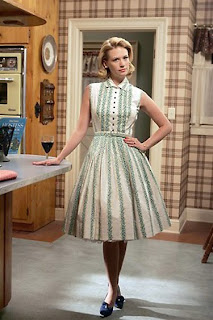
Image credit: http://www.vintagelingerieblog.com/vintage-lingerie/how-does-betty-drapers-dress-flare-out
In one of the greatest examples of Mad Men's dry, subtle humor, Betty and her fellow housewives grill Helen Bishop on why she would walk aimlessly around the neighborhood. Helen responds that she does it because it clears the mind and its good exercise - which leaves the housewives stunned. The interaction is one of many which demonstrates that the perception of women in the 60’s, even of themselves, was that their place was in the home; Betty is never shown shopping (besides for groceries), eating lunch or being out of the house with any of her friends. In today’s culture, housewives are perceived as being constantly out of the household. In fact one of the main stereotypes of an affluent housewife today is the exact opposite - that she is rarely actually at the house. Perfect housewives are more often showcased in pop culture as constantly ‘doing lunch,' shopping and gossiping with their fellow housewives. As the perception of a woman’s place has changed, one of the only factors that has remained consistent in pop culture is a housewife’s love of gossip. Betty and her female neighbors take pleasure in constantly gossiping about Helen Bishop and tearing her down. The central plotlines of many shows, like Bravo’s Real Housewives franchise and sitcoms such as Desperate Housewives and the 80’s Dynasty, revolve around gossiping housewives.

Image credit: http://missericasblog.blogspot.com/2010/08/my-recent-guilty-pleasure.html
As I was watching the portrayal of Betty throughout the entire season and the portrayal of suburban life in general in the 1960’s, there was one massive difference to today’s culture that stood out to me. In today’s suburbia, the “American Dream” is no longer to have a white picket fence in a perfectly manicured lawn, with an apple pie in the window of a Colonial style house with central hallway and four bedrooms. The “Dream” has completely shifted to one that has created the material culture today. It is perceived today that the ideal of every housewife is to own an SUV which you can park outside your McMansion and occasionally drive to the necessary Botox or ‘glass of wine’ sessions with your girlfriends - all while the nanny’s watch your kids of course. Upon my realization that the perception and culture of Housewives has changed so drastically, all I could do was ask myself: Why?
And then I suddenly understood it all. In The Feminine Mystique the author Betty Friedan describes what she calls “the problem with no name." Basically, Friedan suggests that housewives in the 1960’s had a lingering dissatisfaction with their lives as creatures of the home, and they constantly wondered if it was all their was to life. Many believe that the problem has gone away become of changing gender roles and equality in the workplace. The rise of women leaders and business people however has not stopped the existence of housewives. Today’s housewives bury their ‘problem with no name’ under piles of credit card bills, tummy tucks and the word ‘cougar’- but it still exists; the same problem forces them to pressure their husbands into having American Express Black Cards and 10,000 square foot homes. So basically if you’re still looking for someone to blame that pesky little recession on don’t take it out on Freddie Mac or Fannie Mae, blame it on Claire Wellington from down the street.

No comments:
Post a Comment